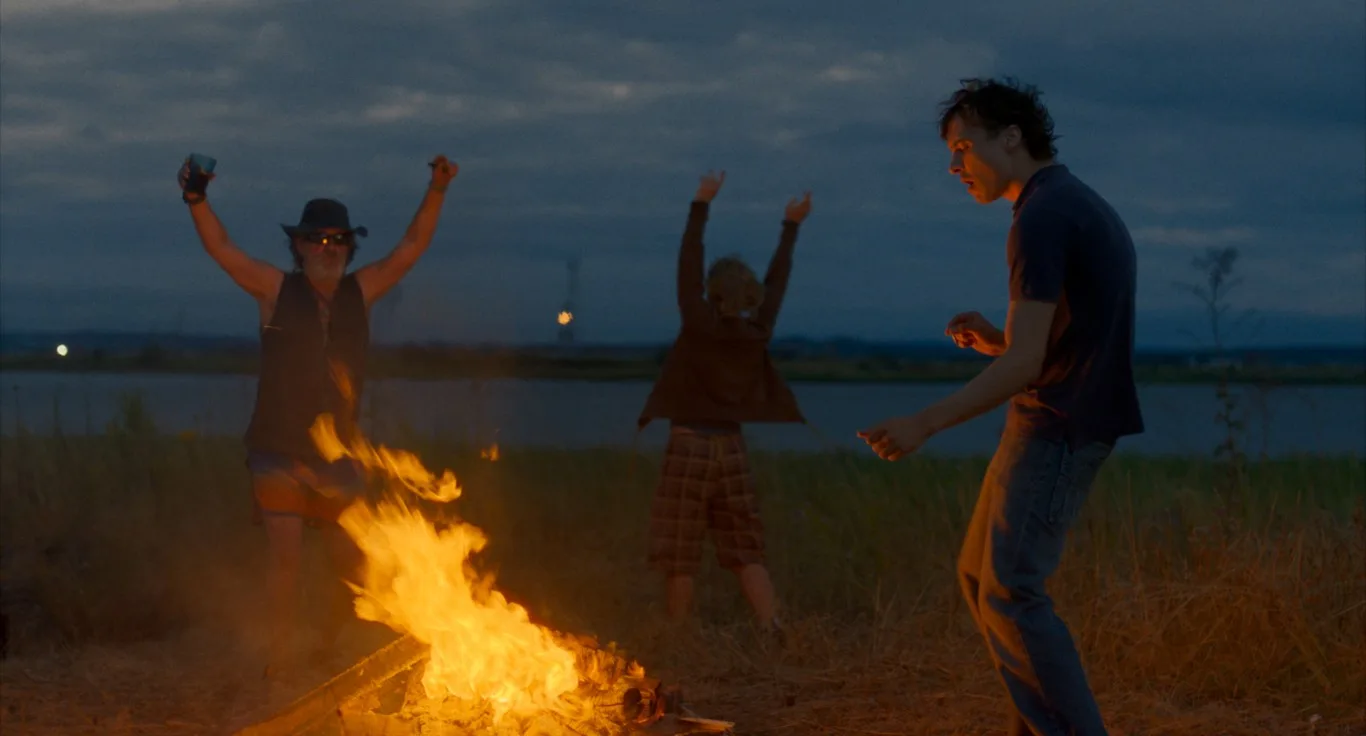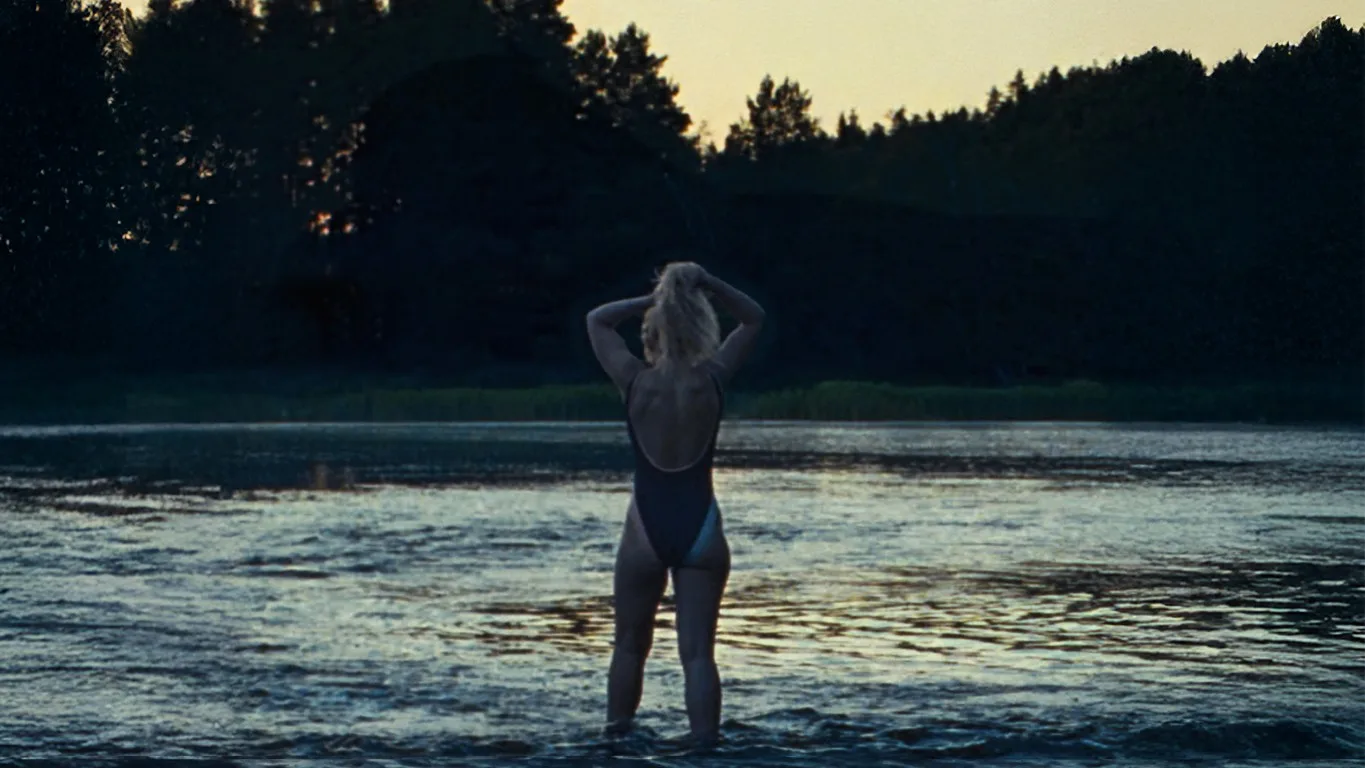The Cannes Film Festival has a long-standing tradition of showcasing actors-turned-directors; one of the great thrills of this edition’s Un Certain Regard section so far has been the triumphant emergence of Kristen Stewart and Harris Dickinson—both fixtures at the festival in recent years for their performances in films like “Crimes of the Future” and “Triangle of Sadness”—as formidable writer-directors in their own right.
Eight years in the making, Stewart’s truly miraculous “The Chronology of Water” adapts Lidia Yuknavitch’s 2011 memoir of the same name into a ferocious, full-throated cri de cœur without sacrificing so much as a molecule of the source material’s bracing physicality and emotional force. Not taking on the lead role herself but imbuing every frame of this film with the tensile strength we’ve come to admire in her as an actor, Stewart instead directs Imogen Poots to the greatest performance of her career.
This is an impressive debut—and, more than that, an exhilarating feat of adaptation. It must have been daunting for Stewart to reach for the same depths of rage, pain, and resilience expressed in Yuknavitch’s bestseller, a shattering account of the sexual abuse she endured in childhood and the instinct toward self-destruction it seared into her being. And there’s great ambition in her effort to relate the jagged and nonlinear recovering of self Yuknavtich survived long enough to experience, at first through competitive swimming and later as a writer of eviscerating experimental prose.
The annihilative impact of trauma—the way it can live just about everywhere in you—has rarely been distilled with the beauty and horror that Yuknavitch afforded it in her memoir. What the author has called “poetics of the body,” all the meaning and memory contained in that razor-thin membrane between our inner and outer selves, can be a slippery concept to grasp. What makes “Chronology” such a masterful debut is Stewart’s innate understanding of how to translate this idea—of the visceral, invisible ways that our bodies keep the score—to the screen.
Reflecting her protagonist’s internal fragmentation, Stewart has made something that’s often closer to an avant-garde collage than a traditional biopic. Still, anything less than the slipstream of sense memory she achieves here, additionally textured by her decision to shoot on faded 16mm, would have diluted the free-form style of her screenplay, which flows between moments of this protagonist’s story in the order they’re recalled, rather than as they happened. “I thought about starting at the beginning,” explains Lidia, “but that’s not how I remember it.”
Her memory is instead “a series of fragments and repetitions and pattern formations” that Stewart interprets in boldly imagistic language, sometimes mournfully and other times with carnal abandon: the softness of a cheek pressed against flushed knees, blood swirling down a drain, ashes at rest in the palm of a hand. These broken little pieces offer an incomplete record, but they cry out still to be reclaimed, reshaped, into a version of Lidia’s life that she can live with; somewhere between lived and imagined experience, that narrative—the one we’re watching—becomes, most of all, a testament to writing as an act of survival.
Structured in five chapters that correspond to those in Yuknavitch’s memoir, “Chronology” is carried forward as much by those shimmers of story as by the immediacy of feeling that’s present in every moment of Poots’ aching and abraded performance. From her traumatic early years as a teen desperate to escape her father’s grip through to her eventual success as an author and educator, across all the volatile love affairs and battles with personal demons in between, Poots never loses sight of Lidia as a woman learning to be at home in her own body and hungry to uncover its every nook and cranny. The film comes alive as she does. “Chronology” is porous in its intermingling of pleasure and pain, and Stewart’s staging of Lidia’s sexual discoveries is charged with not simply joy but the bright glow of revelation; as she orgasms, the entire film seems to explode with her. Stewart’s blood, sweat, and tears are all over this passion project, as are the eight years she spent figuring out precisely how to bring it to the screen. The resulting film is raw and brilliant, a riveting story of creative rebirth that signifies hers most of all.

More conventionally made but compelling on its own terms, Harris Dickinson’s “Urchin” is similarly focused on the self-destructive impulses that can seep into the souls of those caught in the vice grip of addiction. Both films feature evocative early imagery of falling water as it circles the drain, though Dickinson takes the symbolism further than Stewart, following this stream as it descends from a prison shower through the earth’s molten core and into a vibrant sea of microbial life forms, in one of a few surreal flourishes shimmering inside this diamond-in-the-rough study of an unhoused drifter in a downward spiral.
We first encounter Frank Dillane’s character, Mike, sleeping on the streets of London in a drugged-out stupor. It’s been five years since he last had a roof over his head, or so he claims, and he’s grown accustomed to passing out in alleyways, shelters, or wherever it’s possible to rest his head in the moment. Ambling through the city, accosting passerby to ask about the whereabouts of an acquaintance (Dickinson) he insists has stolen his wallet, Mike’s difficult to pin down; friendly and charismatic to some but standoffish to others, he’s the kind of volatile personality you might sympathize with but instinctively go out of your way to avoid.
After he gets into a scuffle, a good samaritan named Simon intervenes and offers to buy Mike a meal. It’s a well-intentioned gesture, but after waiting for Simon to drop his guard, Mike abruptly sucker-punches him, then sprints to pawn his victim’s watch before he’s picked up by the police. Why did he do it? Your guess is as good as his—perhaps better, given Mike’s chronic inability to examine his own impulses.
A resulting eight-month prison stint, though, gives Mike the chance to get clean, at which point Dickinson’s film questions what he’ll make of it. A social worker helps him find a hostel to stay at; a chef in a nearby hotel sets him up as a prep cook in the kitchen. At first, Mike is all in on the straight and narrow: staying sober, listening to guided meditation tapes, even befriending a couple of co-workers who take him out to sing Atomic Kitten’s “Whole Again” at karaoke. For a time, at least, Mike’s riding high — but the power of positive thinking can only take one so far,
Brought face-to-face with Simon again in a conciliatory meeting set up for him to make amends, Mike can instead hardly look his victim in the eyes, let alone take accountability for his behavior. This memorably brief encounter rains on his charade of self-improvement and brings all those erratic patterns back to the surface. Unstable, unpredictable, and—to an extent—unknowable, Mike’s the kind of person who’s spent enough time teetering on the edge that it’s easy, perhaps even tempting, to find himself back there. Dillane’s restless performance shows us somebody running on need, rather than reason; the great achievement of Dickinson’s film lies in how he maintains emotional proximity to such a mercurial figure, allowing us enough access that we start to recognize the expressions moving across his face, like darkening clouds on an overcast day, that precede a course of action.
Although working in a distinctly British mode of kitchen-sink realism pioneered by Ken Loach and Mike Leigh (in particular, the latter’s “Naked”), Dickinson appears just as indebted to the scuzzy, high-wire cinema of Benny and Josh Safdie, counterbalancing street-level realism with absurdist digressions. And he owes much as well—whether knowingly or not—to “Keane” and “Clean, Shaven,” two uncompromising psychodramas made by Lodge Kerrigan in the early 2000s.
A more conventional type of film might have traveled with this character along their long road to recovery, concluding on a note of hard-won triumph. “Urchin” is not that type of film, and Dickinson is—excitingly—not that kind of filmmaker. Instead, while staying close to this uneasy and vulnerable character, Dickinson follows him down the drain with ample sympathy but also a cold, invigorating clarity.












